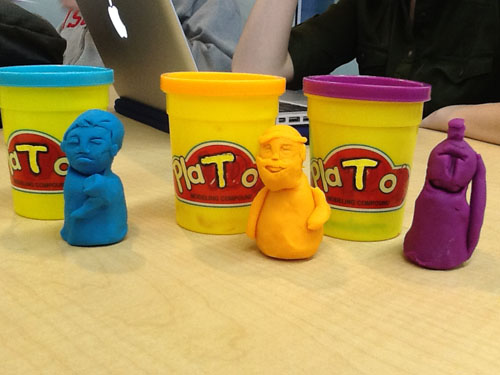Multimodal Remixes
In a graduate seminar called "Introduction to Composition and Rhetoric," students worked in groups to create multimodal remixes of scholarly articles. Students contributed their work to Wikicomp, a project that aims to allow scholars in rhetoric and composition to remix existing articles from College Composition and Communication.
Students took their inspiration for this project from Jody Shipka's Toward a Composition Made Whole, which argues for an expansive definition of multimodal composition. In chapter four of that text, Shipka argues that a "mediated activity-based multimodal framework" presents a unique composition pedagogy that avoids the pitfalls of courses that focus on "the acquisition of discrete skill sets, skill sets that are often and erroneously treated as static and therefore universally acceptable across time and diverse communicative contexts" (86, 83). When composing, Shipka suggests, students should be afforded the opportunity to determine the product, purpose, processes, materials, and conditions under which their product will be experienced. She also asks students to create a Statement of Goals and Choices (SOGC), a document that explains the choices made and asks students to reflect on their process.
Students in the seminar put this approach to the test with their remixes, which could take any form. They were tasked with remixing one of two CCC articles:
Trimbur, John. 2000. "Composition and the Circulation of Writing." CCC 52: 188-219.
Yancey, Kathleen Blake. 2004. "Made Not Only in Words: Composition in a New Key." CCC 56: 297-328.
While remixing these articles, students determined the purpose of the composition, the processes and procedures to be used, the materials necessary, and the conditions under which they would like the audience to experience that composition.
Framing Public Writing: Doorway to... ?
Leigh Elion, Anna Floch, Stephanie Larson, Rebecka Manis, Emily Young
"Our project complicated Kathleen Yancey's notions of public writing. In her article "Made Not Only in Words: Composition in a New Key," Yancey refers frequently to "public writing," and discusses how to bring such writing into the classroom; she does not, however, delve into what constitutes public writing, or how it would translate to the classroom. The constructed doorway presents a series of photographs of writing events which push against Yancey's implicit categories of academic/classroom and non-academic/public writing; we discovered that some writing, though acted out in public, may be academic/intellectual and/or private, in addition/combination to those that were non-academic. Our own notions of writing, in our plight to complicate Yancey's, changed as a part of our process, which served only to further our critique of Yancey's piece."

Plato's Republic, Four Ways
Keith Gabler, Lauryn Gold, Ruth Kellar, Richard Ness
"For this remix, we applied Kathleen Blake Yancey’s remediation methods to Plato’s The Republic. We wanted to run Plato’s text through several different media in order to explore some of the difficulties that one might encounter while trying to enact Yancey’s methods–particularly when a “difficult” text is remediated through a medium that is generally used for everyday compositions. We wound up using four different media: social media (GChat), 3D media (Play-Doh), live performance (skit), and video recording (commercial)."

The Greatest Composition Handbook Never Made
Rachel Carroll, Sunny Chan, Emma Needleman, Jacqulyn Teoh
"Our remix of John Trimbur’s 'Composition and the Circulation of Writing' and Kathleen Yancy’s 'Made Not Only in Words: Composition in a New Key' explores composition as circulation. We created a composition 'manual' Tumblr in order to demonstrate formally the way in which composition works as circulation as well as to suggest the ways that composition takes place outside the act of writing. We hope that our tongue-in-cheek writing prompts offer both critique of traditional composition processes and opportunities to view how we already compose unexpectedly and cooperatively."